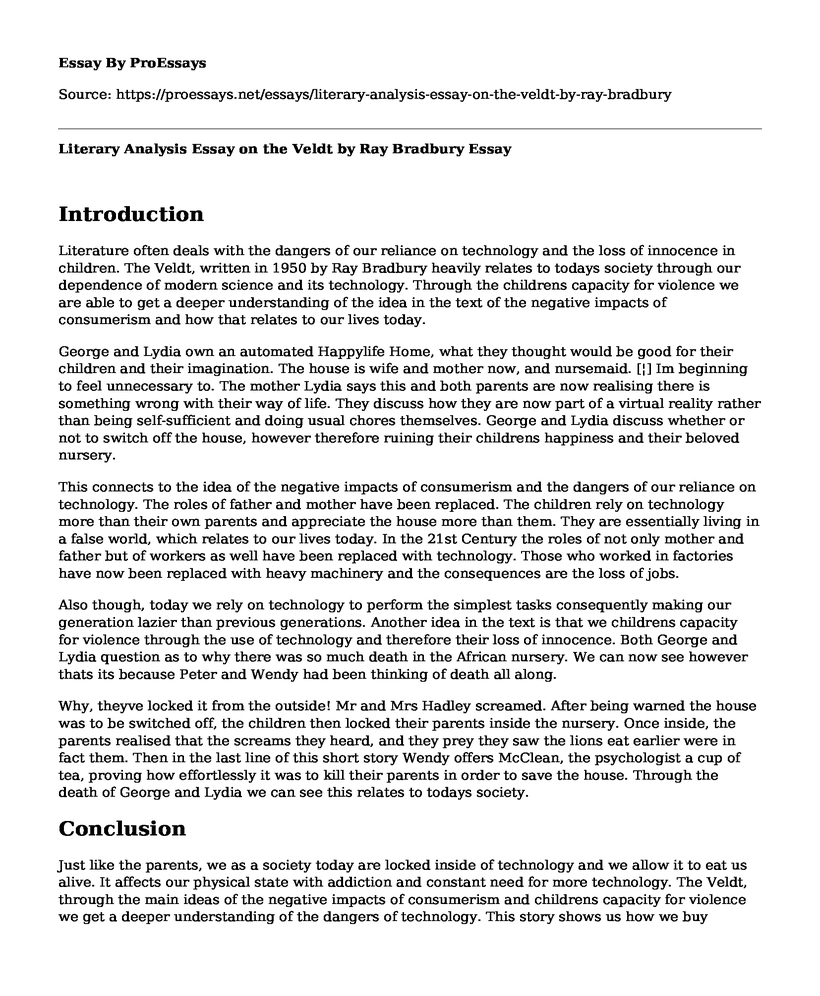Introduction
Literature often deals with the dangers of our reliance on technology and the loss of innocence in children. The Veldt, written in 1950 by Ray Bradbury heavily relates to todays society through our dependence of modern science and its technology. Through the childrens capacity for violence we are able to get a deeper understanding of the idea in the text of the negative impacts of consumerism and how that relates to our lives today.
George and Lydia own an automated Happylife Home, what they thought would be good for their children and their imagination. The house is wife and mother now, and nursemaid. [¦] Im beginning to feel unnecessary to. The mother Lydia says this and both parents are now realising there is something wrong with their way of life. They discuss how they are now part of a virtual reality rather than being self-sufficient and doing usual chores themselves. George and Lydia discuss whether or not to switch off the house, however therefore ruining their childrens happiness and their beloved nursery.
This connects to the idea of the negative impacts of consumerism and the dangers of our reliance on technology. The roles of father and mother have been replaced. The children rely on technology more than their own parents and appreciate the house more than them. They are essentially living in a false world, which relates to our lives today. In the 21st Century the roles of not only mother and father but of workers as well have been replaced with technology. Those who worked in factories have now been replaced with heavy machinery and the consequences are the loss of jobs.
Also though, today we rely on technology to perform the simplest tasks consequently making our generation lazier than previous generations. Another idea in the text is that we childrens capacity for violence through the use of technology and therefore their loss of innocence. Both George and Lydia question as to why there was so much death in the African nursery. We can now see however thats its because Peter and Wendy had been thinking of death all along.
Why, theyve locked it from the outside! Mr and Mrs Hadley screamed. After being warned the house was to be switched off, the children then locked their parents inside the nursery. Once inside, the parents realised that the screams they heard, and they prey they saw the lions eat earlier were in fact them. Then in the last line of this short story Wendy offers McClean, the psychologist a cup of tea, proving how effortlessly it was to kill their parents in order to save the house. Through the death of George and Lydia we can see this relates to todays society.
Conclusion
Just like the parents, we as a society today are locked inside of technology and we allow it to eat us alive. It affects our physical state with addiction and constant need for more technology. The Veldt, through the main ideas of the negative impacts of consumerism and childrens capacity for violence we get a deeper understanding of the dangers of technology. This story shows us how we buy devices without worrying about what they might do to our lives. It shows us the severe consequences of technology and illustrates how we as a society need to recognise the dangers before its too late.
Cite this page
Literary Analysis Essay on the Veldt by Ray Bradbury. (2022, Jul 28). Retrieved from https://proessays.net/essays/literary-analysis-essay-on-the-veldt-by-ray-bradbury
If you are the original author of this essay and no longer wish to have it published on the ProEssays website, please click below to request its removal:
- Annotated Bibliography on American Dream and Identity Issues
- Trust and Decisions in "Hills like White Elephants" and "Story" Essay
- Literary Analysis Essay on "Sympathy" by Paul Laurence Dunbar
- Beloved vs. Incidents in the Life of a Slave Girl Essay Example
- Literary Analysis Essay on The Story of The Story of Hour by Kate Chopin
- The Yellow Wallpaper: Gilman's Story of Depression and Recovery - Essay Sample
- Othello: The Unveiling of Pride and Its Consequences - Essay Sample







